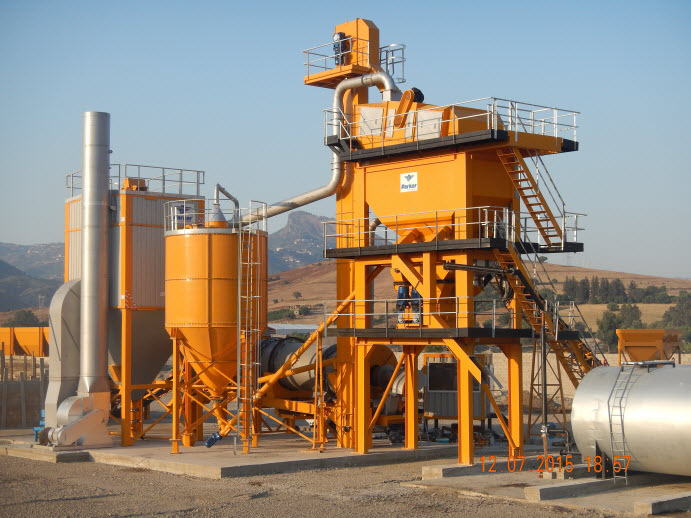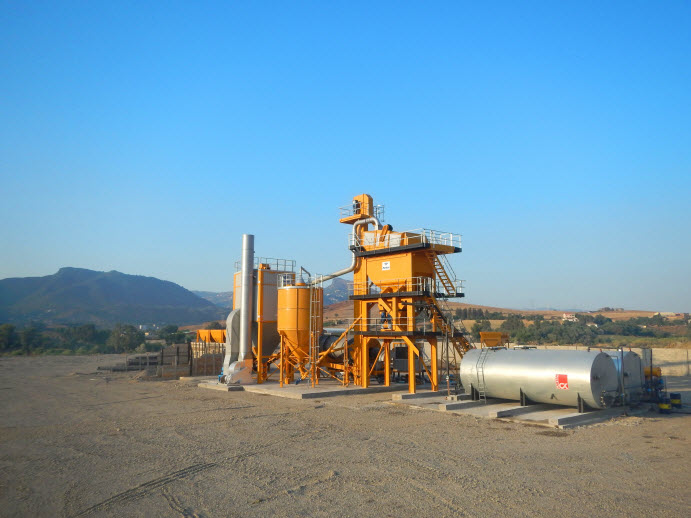I. Introduction
Asphalt is fundamental in modern construction, underpinning the majority of roads and highways globally. This versatile and durable material is preferred for urban and transportation infrastructure due to its reliability under various environmental conditions. The introduction traces asphalt's transformation from naturally occurring bituminous substances to the highly processed material used today, highlighting how technological advances have streamlined its production. These innovations have made asphalt production more efficient and environmentally friendly, showcasing the industry's ability to adapt and evolve.
II. The Evolution of Asphalt Plants
The development of asphalt plants is a testament to industrial innovation. Early asphalt production was labor-intensive, with minimal technology. The introduction of mechanical mixers in the 20th century marked a significant advancement, followed by the development of automated control systems that further revolutionized the process. Modern asphalt plants are highly mechanized and capable of producing high-quality asphalt efficiently. This evolution reflects broader trends in industrial manufacturing, emphasizing precision and sustainability.
III. Core Components of Modern Asphalt Plants
In today’s asphalt plants, several key components are crucial for efficient operation. Aggregate bins store and feed different sizes of sand and stone into the production process. Conveyors transport these materials to the dryer, which removes moisture to prepare them for mixing. Burners heat the aggregates, and mixers combine them with asphalt cement. Storage silos keep the final product hot until it is dispatched. Advances in these components have enhanced the efficiency of asphalt plants, enabling them to produce consistently high-quality asphalt with reduced environmental impact.
IV. Breakthrough Technologies in Asphalt Production
Innovations such as energy-efficient dryers and advanced mixing techniques have transformed asphalt production. These technologies reduce the energy consumption and emissions associated with manufacturing asphalt. The use of recycled materials, such as reclaimed asphalt pavement (RAP), has also become more common, driven by technological improvements that allow old asphalt to be reused in new mixtures without compromising quality. Such breakthroughs not only improve operational efficiency but also advance the industry's sustainability goals.
V. Automation in Asphalt Plants
Automation has significantly impacted asphalt production by enhancing efficiency, safety, and quality. Modern plants use automated systems to control the entire production process, from feeding raw materials to packaging the finished product. These systems ensure precise measurements and optimal mixing conditions, reducing waste and ensuring consistency. Automation also limits human error and increases safety by reducing workers' exposure to hazardous conditions. As technology advances, we can expect even greater integration of automation, potentially incorporating artificial intelligence to optimize production further.
VI. Environmental Impact and Sustainability
The asphalt industry has faced significant scrutiny regarding its environmental impact, particularly in terms of emissions and energy usage. However, modern asphalt plants have adopted green technologies such as fume recovery systems and low-emission burners to mitigate these concerns. Sustainability efforts are further bolstered by the increased use of recycled materials and the development of warm-mix asphalt, which is produced at lower temperatures, reducing energy consumption and emissions. These environmentally friendly practices not only comply with stringent regulations but also reflect a growing commitment within the industry to sustainable development.
VII. The Role of Big Data and IoT
The integration of Big Data and the Internet of Things (IoT) in asphalt plants represents a transformative shift towards more connected and data-driven operations. Sensors and IoT devices collect real-time data on everything from material temperatures to machine performance, enabling operators to optimize the manufacturing process and predict maintenance needs. This technology leads to better resource management, reduced downtime, and improved overall efficiency. As data analytics evolve, these tools will become more predictive and responsive, driving further improvements in asphalt production.

VIII. Safety Enhancements in Asphalt Plants
Safety remains a paramount concern in the operation of asphalt plants. Recent advancements have focused on reducing workplace accidents and increasing operational safety through technology. Automated systems reduce the need for direct human interaction with hazardous materials and machinery. Furthermore, the implementation of rigorous safety protocols, enhanced training programs, and real-time monitoring systems helps to safeguard workers against common industry hazards. These improvements not only enhance worker safety but also contribute to more stable and efficient plant operations.
IX. Quality Control and Assurance in Asphalt Production
Maintaining high standards of quality is critical in asphalt production. Modern plants employ sophisticated quality control systems that monitor every stage of the production process, from aggregate grading to the final asphalt composition. Technologies like automated sampling and testing equipment provide consistent and accurate data, ensuring that the asphalt meets all specifications and regulatory standards. These systems help in identifying discrepancies early, allowing for immediate corrections and minimizing waste. Quality assurance is thus integral to operational excellence and customer satisfaction in the asphalt industry.
X. Economic Aspects of Modern Asphalt Production
Adopting advanced technologies in asphalt production can be economically beneficial. While the initial investment in modern machinery and technology may be high, the long-term savings from increased efficiency, reduced waste, and lower energy costs can be significant. Additionally, the ability to use higher percentages of recycled materials can reduce raw material costs substantially. Economic analysis shows that these technologies can deliver a strong return on investment (ROI) by optimizing production costs and enhancing product quality, thereby ensuring competitiveness in a crowded market.
XI. Global Innovations and Their Local Impact
Asphalt technology is not developed in a vacuum and often benefits from global innovations adapted to local needs. For example, European advancements in eco-friendly asphalt solutions influence practices in other regions, promoting sustainability worldwide. Similarly, technologies developed in the high-demand markets of Asia are rapidly adopted elsewhere, demonstrating scalability and adaptability. This section examines how global technological trends are implemented locally, providing case studies from various regions that highlight successful adaptations and the challenges faced during implementation.
XII. Challenges in Adopting New Technologies
Despite the clear benefits, the adoption of new technologies in asphalt production faces several challenges. Financial barriers, such as high initial costs and uncertain ROI, can deter investment. Technological compatibility issues with existing equipment and infrastructure can also pose significant hurdles. Additionally, there is often a cultural resistance within industries to change established practices, especially in sectors where traditional methods have prevailed for decades. This section will discuss strategies to overcome these challenges, including government incentives, educational programs, and phased technology integration plans.

XIII. Future Predictions and Trends
Looking ahead, the asphalt industry is poised for further technological advances. Experts predict that innovations in areas like nanotechnology, advanced materials, and further automation will drive the next wave of advancements. The potential integration of artificial intelligence for predictive maintenance and optimization is particularly promising. This section will explore these future trends and their potential impacts on the industry, suggesting that asphalt plants of the future will be more efficient, environmentally friendly, and safer than ever before.
This comprehensive discussion highlights the breadth and depth of modern innovations in asphalt plant technology, illustrating the industry's ongoing commitment to improvement and adaptation.
XIV. Industry Voices: Interviews and Insights
Interviews with industry leaders have revealed a consensus that technological innovation is crucial for the future of asphalt production. An engineer from a leading asphalt equipment manufacturer emphasized the potential of automation in increasing precision and reducing operational costs. Meanwhile, an environmental scientist highlighted the environmental benefits of adopting greener technologies, such as the use of biofuels and solar energy in asphalt production processes. These insights suggest that while the industry faces challenges, there is a clear path forward that involves embracing technology and sustainability.
XV. Legislative and Regulatory Framework
The asphalt industry operates within a complex regulatory framework designed to ensure product quality, worker safety, and environmental protection. For instance, the United States has stringent emissions standards that asphalt plants must meet, which has driven the adoption of advanced emission control technologies. Similarly, European regulations focus heavily on the sustainability of production processes, encouraging plants to minimize their environmental footprint. These regulations not only shape the operations of asphalt plants but also push the industry towards innovation, ensuring that technological advancements align with regulatory requirements.
XVI. Training and Education
The shift towards more sophisticated asphalt production technologies necessitates a well-trained workforce. Recognizing this need, industry associations and educational institutions have developed specialized training programs that cover everything from the basics of asphalt composition to the operation of high-tech equipment. These programs are crucial for ensuring that workers are able to operate new machinery efficiently and safely. Additionally, ongoing education in the latest industry trends and technologies helps professionals adapt to changes and innovations, maintaining the industry's high standards of quality and safety.
XVII. Consumer Education
Increasing public awareness about the advantages of modern asphalt technologies is crucial for the industry's growth. Public education campaigns have been effective in explaining the environmental and economic benefits of new asphalt technologies. For example, explaining how recycled asphalt reduces waste and costs can help garner public support for projects that utilize these materials. Moreover, such campaigns can shift public perception, promoting a more positive image of the asphalt industry as a forward-thinking sector committed to sustainable practices.
XVIII. FAQs - Asphalt Plants
Modern technologies reduce emissions, lower energy consumption, and enable the use of recycled materials, significantly mitigating the environmental impact of asphalt production.
While the initial investment may be high, the long-term savings from increased efficiency and reduced waste lead to lower overall production costs.
The future is likely to see increased automation, greater use of sustainable materials, and further innovations in energy efficiency.
XIX. Conclusion
The advancements in asphalt plant technology have significantly reshaped the industry, making it more efficient, sustainable, and responsive to environmental concerns. The adoption of new technologies, combined with a commitment to training and public education, positions the asphalt industry well for future challenges and opportunities. As roads continue to be a vital part of global infrastructure, the innovations in asphalt production ensure that this industry remains at the forefront of technological and environmental advancements.
Read More Articles About Asphalt Batch Plants
- Asphalt Plant Safety: Protocols and Procedures
- How to Evaluate Asphalt Plant Manufacturers?
- Asphalt Batching Plants Maintenance and Care for Optimal Performance & Longevity



